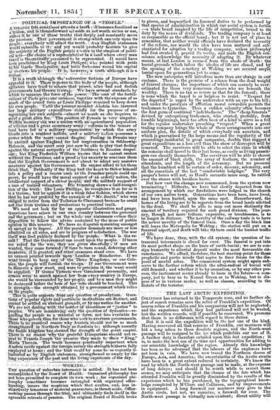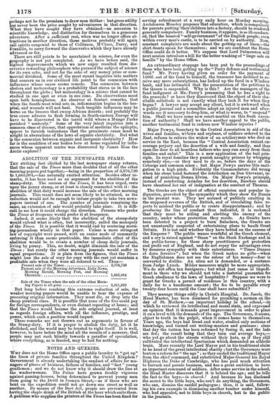- - „ TITE 'LAST ARCTIC TYTREDITION. :
COLiiiisON has returned to the Temperate zone, and no further oh- Sect of. search remains save the relics of Franklin's expedition. Of course relics of Franklia and his companions will not be neglected; and the experience which they liaci gathered will not be wasted, but tlaa written records, will if possible be recovered. We presume that there. is no difference with regard to these duties: But it is said the expedition will be the last one Of the kin* Having recovered all that remains of Franklin, our mariners Will -bid a- lone 'adieu to those desolate regions, and the North-west passage will be -resigned to the ice which prohibits our use of It. A further duty ia therefw entailed upon this last expedition; 'it is, to make the,best Use of its time and, opportunities for adding to our scientific knowledge of the region. Already this knowledge has been so far, advanced that the labours of the explorers have not heen in vain. We have now traced the Northern shores of Europe, ;Asia, and, America; the uncertainties of the Arctic straits have ben to a great extent reduced to certainty. We know the read by Which the North-west passage can be made, at the expense of -long delays; and should it be. worth while to revisit those scenes we may anticipate that the chance of the fate which his attended Franklin will be greatly diminished by the results of the experience which he has purchased, by the topographical know- ledge completed by 11P,Clure and Collinsou, and by improvements in equipment. A long farewell our mariners may give to the Arctic circle, hut not, we -obneeiVie;',' a farewell for ever. The North-West passage, is virtually non-Siciatent; direct utility Will
perhaps not be the premium to draw men thither: but gross utility has never been the prize sought by adventurers in that direction. What they have sought they have obtained—au accession to scientific knowledge, and distinction for themselves in a generous adventure. After a sufficient rest, when war no longer offers at- tractions in another direction, those motives probably will again call spirits congenial to those of Collinson, M'Clure, Parry, and Franklin, to carry forward the discoveries which they have already advanced so far.
There are still points to be ascertained in science, for even the geography is not yet completed. As we have before said, the highest improvements which we now enjoy resulted from dis- coveries rewarding philosophers who pursued the subject of science for its own sake, and not for the sake of any money prize or com- mercial dividend. Some of the most recent inquiries into matters that concern us in our civilized life_ point to the connexion with influences whose cause seems remote. The connexion between cholera and meteorology is a probability that stares us in the face throughout the globe ; but meteorology is a science that cannot be studied in one spot or even in one zone. Its observations must span both hemispheres. An observer at Scutari remarks, that when the South-west wind sets in, inflammation begins in the hos- pital, and wounds will not heal. Such tangible influences may be borne on the breezes that sweep African deserts ; and probably the true cause adverse to flesh forming in South-eastern Europe will flare to be discovered in the torrid wild where a Mungo Parke
i pershed "uselessly." Some of the very latest inquiries into a _
common class of disease, that opprobrium of medicine the epileptic, appear to furnish indications that the proximate cause must be sought in aberrations of the laws of organic electricity. But what ia the connexion between organic and inorganic electricity? How far is the condition of our bodies here at home regulated by influ- ences whose apparent centre was discovered by James Ross the Arctic explorer ?



























 Previous page
Previous page